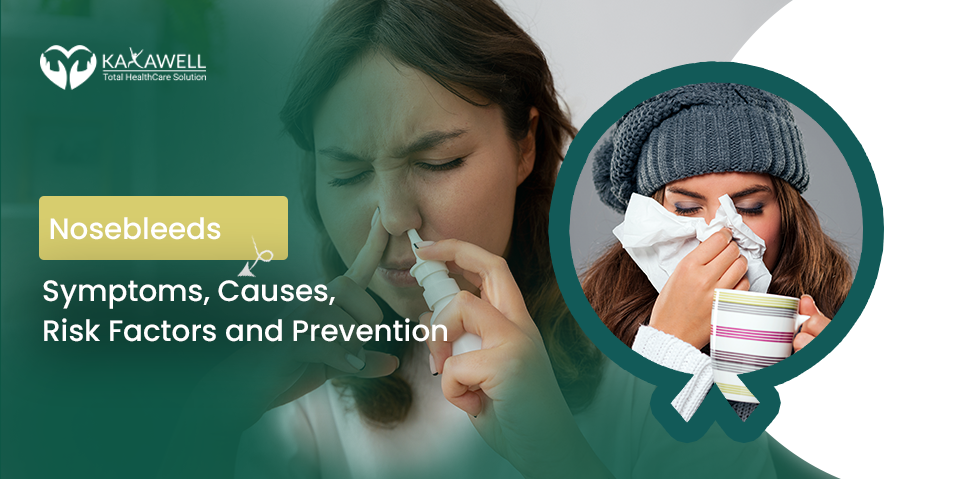Nosebleeds are common. They may be frightening but they rarely point to a serious medical problem. The nose contains many blood vessels in the front and backs of the nose, located near the surface. They’re very fragile and bleed easily. Nosebleeds are common in adults and children between the ages of 3 and 10.
There are two kinds of nosebleeds. An anterior nosebleed happens when blood vessels burst and leak at the front of the nose.
A posterior nosebleed occurs in the back of the nose’s deepest part. Blood flows down the back of your throat in this case. Posterior nosebleeds can be dangerous.
Read Also: Home Remedies for Foot Pain
Symptoms
A nosebleed’s primary symptom is blood from the nose, which may range from mild to high. The blood comes out of either nostril (usually, only one nostril is affected).
If the nosebleed occurs when lying down, it is normal to feel liquid in the back of the throat until blood comes out of the nose. It is best not to swallow the blood as it could cause feelings of nausea and vomiting. Severe nosebleeds require immediate medical attention. Things to watch for include:
- Heavy Bleeding
- Palpitations (An Irregular Heartbeat)
- Swallowing Large Amounts Of Blood That Causes Vomiting
- Shortness Of Breath
- Turning Pale
Read More: Top 10 Workouts To Cure Depression & Anxiety
When to call your doctor
Nosebleeds and headaches will mostly go away on their own.
People can stop a nosebleed by exerting firm pressure on the area near the bone in the nose. Taking pain relievers over-the-counter (OTC) can usually help get rid of a headache.
However, it is sometimes better to contact the emergency services or go to the emergency room immediately. Seek medical emergency treatment for headache, nosebleed, and one or more of the following symptoms:
- Fainting
- Confusion
- Paralysis On One Side Of The Body
- Fever
- Difficulty Speaking
- Trouble Walking Or Performing Other Movements
- Nausea Or Vomiting
A person should also seek medical attention immediately if they have Nosebleeds:
- A broken nose
- Bleeding that lasts longer than a few minutes
- Excessive bleeding
- Bleeding that is causing breathing issues
It is best to schedule a visit with a healthcare provider if a person experiences symptoms that:
- Interfere with daily life
- Do not improve despite taking otc medicine
- Are ongoing
- Are getting worse
What Causes Nosebleeds?
The most common causes of nosebleeds are dryness (often caused by winter indoor heat) and nose picking. These 2 factors work together — nose-picking happens more often when there is dry and crusty mucus in the nose.
Other causes, less common, include injuries, colds, allergies, and cocaine use. Children may stick small objects up their noses. Older people may have atherosclerosis (which is the hardening of the arteries), infections, high blood pressure, and blood clotting disorders. Nosebleeds can occur if you take medications that interfere with blood clotting, for example, aspirin. A condition called inherited hemorrhagic telangiectasia (HHT) is a rare cause of recurrent nosebleeds. Sometimes, the cause of nosebleeds can’t be determined.
Read More: Best Exercise to Increase Height
What are the risk factors for nosebleeds?
Several factors increase the risk of developing nosebleeds. Not everyone with risk factors gets nosebleeds. Risk factors for nosebleeds include:
- Allergies
- Family history of bleeding disorders, such as hemorrhagic telangiectasia
- Tumors of the sinuses and nasopharynx
- Tumors
- Use of certain medications, such as anti-inflammatory drugs, blood thinners, or aspirin
Complication
Nosebleeds can sometimes be distressing due to the amount of visible blood loss, but they are very common.
If you have heavy or recurring nosebleeds, your GP may refer you to an ear, nose and throat (ENT) specialist for further investigation.
Anemia
Excessive bleeding over a while can lead to anemia (a group of disorders affecting red blood cells). Frequent (more than once a week), or heavy, nosebleeds can contribute to this condition if you are losing a lot of blood. Other symptoms, such as tiredness, will also be present. You should mention your nosebleeds to your GP if you suspect that you have anemia.
Nasal deformity
A broken nose can result in a permanent change to the shape of your nose. If you break your nose, an ENT (ear, nose and throat) specialist will attempt to manipulate your nose (move it back into place with their hands) while you are under anesthetic. However, this is not always effective and surgery may be required to correct the shape of your nose.
Prevention
You can help to prevent nosebleeds by:
- Not picking your nose
- Being gentle whenever you blow your nose
- Not smoking
- If your indoor climate is dry during the winter months, use a humidifier
- The use of protective devices to prevent harmful substances from respiring at work
- Before bedtime apply a dab of nasal gel or petroleum jelly to the inside of your nostrils
- Using a nonprescription saline nasal spray to moisturize the inside of your nose
- Prevent facial injuries by wearing a car seatbelt and shoulder harness and using a well-fitted headgear to cover the face during contact sports such as football or karate

Leave a Reply
You must be logged in to post a comment.